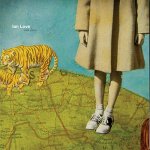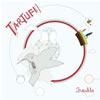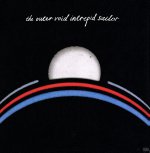6 Music Reviews
Ian Love, self-titled (Limekiln)

Ian Love's opening track sets a vivid scene, him crooning in a hushed yet romantic voice over delicate guitar, setting a scene of two lovers in a house far away from everything, turning to each other for solace from fear. "And I stay quiet / and we're so patient / as the stars jump side to side /and this feels like the only night," he sings, as the music itself communicates the exact same feeling. Sensitive, gently arranged orchestral folk/pop is at the forefront of this album, which through and through has this gorgeous starry-night mood and an emotional balance between hope and hurt. Love's voice resonates both with emotion and a certain light glamour, one accentuated through the music, with its array of tinkling pianos and timeless folk guitars. Each song's narrator is filled with deeper concerns and troubles beneath the dreamy surfaces. On "Butterfly" Love expresses an awe of nature driven by a longing for a better, easier life. The darkly rolling "Turn Off" portrays a mind haunted by voices of worry. "So what you're alive / it's only a matter of time," he sings on "Black Diamonds." The whole album is this expression of agony that's dressed to the nines, wearing a glamorous evening dress: depression dressed up in diamonds and dreams. – dave heaton
Pepito, The New World (Static Discos)

Pepito's new album The New World is less streamlined and direct than their last album Everything Changes, though the minimalist, melodic pop sense is the same and the electronic textures just as compelling. It's fitting for a New World to be more complicated, a bit messier, and this one is. The tracks groove in a less immediate way, feeling more unstable, more apt to go several directions at once. Occasionally little melodies shake themselves loose from the foundation and squirm about underneath the main tune, moving about with the sputtering rhythms, vaguely soaked in the vibe of the California-Mexico border. Pepito's Ana Machado and Jose Marquez sing in both Spanish and English this time, their simple yet suggestive lyrics highlighting the complexity of the modern world, where everything's new but is it really? Where everyone wants answers but no one really has them. "We are the new world / you are so old", they sing in a taunting way over drum-n-bass on the album's joyous "Get Out." But other songs ("Andas," "A Day in L.A.", "The New World") are filled with reminders that our world is full of sadness and pain, that no "new world" is coming to make everything perfect. Still the idea of a new world is a hopeful one. The title track makes it clear that holding onto an idea of a bright new tomorrow can make people work towards it, and the captivating uniqueness and irregularities of Pepito's music underscore that sense of possibility. "The future is a place / don't let it go to waste." – dave heaton
Saloon, Lo-Fi Sounds, Hi-Fi Heart (Darla)

I love the cover art for Saloon's new singles, etc. compilation Lo-Fi Sounds, Hi-Fi Heart, with its placement of a classic jukebox over a bright cartoon rainbow. It evokes the feeling that 7" vinyl singles are special things, like UFOs or beams of light from another world. Saloon's songs themselves give me that same feeling; they occur in some place out of fashion, where retro/future synthesizers support a ballad from a half-asleep chanteuse. Their music has a dusty, slightly distant sound that's also warm, intimate, filled with tangible atmosphere. Saloon as a band is no more, but here's a collection that eludes that fact, appearing vibrant and alive. Song after song there's a melancholy mood, with Amanda Gomez's enchanting voice wrapped around pretty melodies that are tied to lyrics that lightly touch your ears and then evaporate before you've really grasped them. Sometimes Saloon plays lullabies, sometimes minor-key Stereolab jaunts, sometimes bouncy space-pop singles. And then sometimes they'll meander along to the garbled sounds of a radio transmission from space, a broadcast from the same distant planet from which this unearthly, spellbinding band must really have come. – dave heaton
Sound Providers, Looking Backwards: 2001-1998 (ABB Records)
The title Looking Backwards references the fact that the hip-hop trio the Sound Providers broke up in 2001, and this collection pulls together odd unreleased/promo tracks from their 1998-2001 existence. But the title could just as well be describing their sound, which was undeniably retro, from their absolute-basics rhyming style to the jazz-soul slant of the music. Their music feels old-fashioned in its focus on the simple pleasures, but that's also its strong point, why it still sounds so damn good. Every track is simple – take a clip from a track by a beloved contemporary (a Guru quote from a Gan Starr classic, for example) and build it into a hook. Place some basic rhymes, not especially unique in content or delivery, around them – mostly about creativity and the art of MCing. And then, most importantly, build a smooth, classically jazzy atmosphere around it. That's what takes their music to another level: how effortlessly they build a sublime, pleasurable mood out of jazz textures. Part of a piano or guitar solo is looped until it forms a relaxed, riveting foundation. On track after track they take pieces of jazz, throws in a bit of a soul groove or melody, some basic but funky drums…the result is a low-key kind of magic. It doesn't matter that their rhymes are forgettable and their overall approach pretty repetitive; all that matters is that soothing, fulfilling, jazz-ridden hip-hop groove that they do so well. – dave heaton
Tartufi, Trouble EP (Acuarela)

The San Francisco-based trio Tartufi makes a strong impression quickly with their 4-song EP Trouble. They have an intense yet melodic sound, built around guitars and drums and bass, and the way that Simone Grudzen and Lynne Angel sing off each other, their voices helping propel the song to a greater, more forceful place. In that way they're reminiscent in some ways of a more rocking Mates of State or fuzzier Rainer Maria, in that their voices become key instruments even as they communicate feelings and set up scenes. Trouble captivates instantly with the song "Midnight Tracks", with rolls forward powerfully. As the EP proceeds their sound gets bigger and more inclusive. Xylophone and moog enter the picture, adding lighter textures to the mix, and the trio's tight playing and singing starts to take off in grander, bigger, more open-ended directions. The six-minute "Slaw Man" starts off as a graceful, slowly building instrumental, before the singers come in explosively and slam the song up a hundred notches. By the end of the last song, the powerhouse "Nurses," you're left in awe at how versatile yet distinct their music is…you're left more or less with your jaw hanging open (or at least I was, and am each time I listen). – dave heaton
The Universe, The Outer Void Intrepid Sailor (Microindie)

Space is the place…whenever a band uses intergalactic imagery and themes, you know they're going to be tripping off with music to take drugs to, right? Not necessarily. Australian trio The Universe (Architecture in Helsinki's Gus Franklin, his brother Lachlan, and Benjamin Browning) have space on the brain, but they're not trying to mimic space-exploration by improvising galaxies of sound. Instead, The Outer Void Intrepid Sailor is a superb pop album in the vein of Beulah or the Apples in Stereo (and therefore the Beatles, Beach Boys, and Zombies before them), with catchy melodies and harmonies arranged in a careful, ear-pleasing way. It swoons in a pretty, dreamy way, one that does evoke the feeling of space, of an astronaut floating untethered, eyes open wide. The space theme in this case isn't just imagery, either. It's wrapped together with bigger philosophical questions, about human's place in the world and wondering what is out there, what this is all about. The importance of life, how we think about what we see and don't…this is all a part of these imminently catchy pop songs, which are woven together to form a greater whole, one telling a literal story while investigating bigger questions. Best of all the songs are superbly crafted and memorable, for melody and mood. Floating-in-space ballads like "Grand Central," "Goodbye," and "Spacelullabye" form many of the high points, though as the album proceeds the group rocks it up a lot more, injecting their songs with energy and a bit of that interplanetary experimentalism. Towards the album's end the music gets more overtly psychedelic, and the album keeps seeming to end before beginning again: just one more way of exploring the infinite, and the question of what's out there ("There Is Nothing Out There…", the last song is titled.) – dave heaton
Copyright (c) 2006 erasing clouds |
|